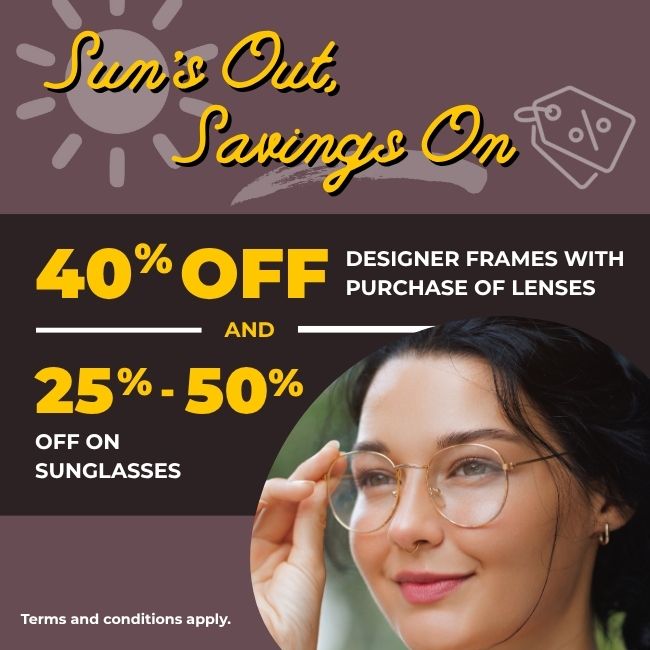Not all eyeglasses require an eye exam, but you should still get both—eye exams every 2 years and glasses as often as like! With so many different types of glasses, it can be challenging to decide what kind of frames or lenses would suit you best.
Not all glasses are created the same. For example, sunglasses can simply be tinted eyeglasses, or they can be powerful shields from UV rays. When you go out on a sunny, hot day, you protect your skin from UVA and UVB rays by applying sunscreen, and the same protection should be applied to your eyes.
Polarized sunglasses may not always provide UVA and UVB protection, but they do protect the eyes. When in a high-glare environment or surrounded by smooth, bright surfaces such as water, glass, or snow, polarized sunglasses minimize glare and enhance clarity. However, polarized sunglasses are not safe in certain scenarios, particularly driving at night.
What Are Polarized Sunglasses?
Polarized sunglasses can reduce the influence of intense or bright light, enhancing your visual clarity, contrast, and comfort, as well as your depth and colour perception. This is achieved by a film applied to the lens which only allows in vertical light rays and blocks horizontal light rays.
How Are Polarized Sunglasses Different from Regular Sunglasses?
The difference between polarized sunglasses and regular sunglasses is pretty simple. Non-polarized lenses provide light protection, but they lack an integrated filter to cut down on glare or block off horizontal light rays.
Why Were Polarized Sunglasses Invented?
Developed in the mid-thirties, polarized lenses were a means to reduce dangerous glare from smooth surfaces like glass, asphalt, and water. Polarized sunglasses were the most logical evolution. They have long since become a mainstay of the eyewear industry.
When Should You Use Polarized Sunglasses?
Polarized sunglasses can be appropriate for everyday use.
When you think about polarized sunglasses, you may think they’re only used for fishing, boating, skiing, or other sports where you would find yourself in an environment that has a lot of reflective glare, however, polarized sunglasses provide a clear view while blocking out sun glare from everyday activities such as driving or even going for a walk on a nice day. They can even be worn in most work environments!

When Should You Not Use Polarized Sunglasses?
Despite polarized sunglasses being ideal for everyday use, there are some scenarios where you would be better off without them.
Polarized sunglasses reduce the ability to read liquid crystal displays, or LCD displays, which can be found in TVs, smartphones, computers, and the cockpit of airplanes. Therefore, a pilot wearing polarized sunglasses might not see a glint of light coming from the windshield of another plane. Polarized sunglasses might also be a problem for professions where it’s crucial to keep an eye on the score or data on LCD screens, such as sportscasters and analysts.
When hiking or skiing in the mountains, polarized sunglasses may make it difficult to tell snow and ice apart due to both surfaces being white.
Another more simple scenario is driving at night. Although polarized sunglasses help lessen glare from approaching vehicles, they don’t assist in nighttime driving and may even be dangerous because they block light in an environment where there is already little light, which can impair your vision.
Pros & Cons of Polarized Sunglasses
Whether polarized sunglasses are right for you remains a personal decision, but it’s a good idea to review the facts.
Pros of Polarized Sunglasses
- Enhanced clarity, contrast, and precision of vision
- The improved depth and colour perception
- Reduced glare exposure
- Improved eye comfort and decreased eye fatigue
- Can be paired with UVA and UVB protection for all-in-one sunglasses
Cons of Polarized Sunglasses
- LCD screen viewing can be challenging and lead to dangerous situations
- Having problems telling snow from ice on mountains due to both being white
- Providing excessive filtration to some wearers
- Due to glass tempering, polarized sunglasses may distort vision
- Without lower contrast, it may be more difficult to distinguish depth
Find the Right Lenses for Your Lifestyle
Whether you’re looking for fashionable frames, corrective lenses, safety wear, or sunglasses, Calgary Optometry Centre has all the options in one place. Our team can help you decide and offer advice for what might work best for your lifestyle. Book an appointment and come browse our selection today!




